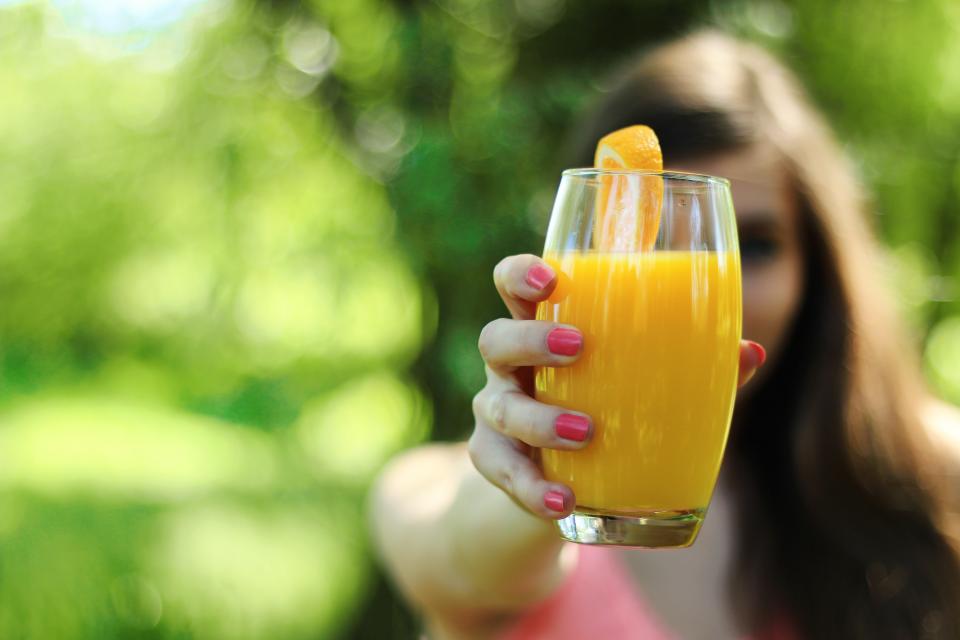To figure that out, German and Saudi researchers started with a big batch of fresh navel oranges. They analyzed the fruit in three forms: peeled segments, a mashed-up puree and as juice, both fresh-squeezed and pasteurized. They found that levels of vitamin C and carotenoids were basically the same in the juice and the unprocessed fruit, while levels of flavonoids were significantly lower.
But then the scientists threw their orange test foods into in a test tube model designed to mimic digestion, and that's when things got interesting: Much more of the carotenoids and flavonoids were released from the orange juice than from the fruit slices or mush. The differences were striking: Carotenoid release went up from nearly 11 percent in the fruit to 28 percent in the fresh juice, and up to 39.5 percent in the pasteurized juice. Meanwhile, flavonoids were boosted nearly five-fold in juice compared to fruit.
The findings, which appear in the Journal of Agricultural and Food Chemistry, are scientifically intriguing. For example, the researchers suspect heat may have something to do with the extra carotenoids released in pasteurized juice.
Drinking a glass of freshly squeezed juice is not only refreshing and delicious, but provides numerous health benefits that often get lost in the processing that juices in jugs or cartons undergo. Drinking freshly squeezed juice can also be an efficient way to reach your recommended five to 10 servings of fruits and vegetables a day. Juice squeezers and blenders are also cost-effective, allowing you to make your own healthy cocktail of nutrients without paying for fancy packaging and marketing.

Reduced Calories and Sugar
Processed juices often contain a large amount of added sugars or sweeteners, which adds calories to your diet. Though there are natural sugars in some freshly squeezed fruit juices, the amounts are much smaller and will help you avoid the inevitable fat storage that ensues with excess amounts of sugar in the diet. You also avoid a lot of other processed ingredients, such as fructose, corn syrup and food coloring -- all unnatural substances that do not provide any real nutritional value to your body.
Prevention and Protection
Drinking freshly squeezed juice, in its most natural, unprocessed form, can help to ward of many ailments. Drinking citrus juices two to three times a week can help in prevention of kidney stones, and cherry juice has been linked to helping with gout and gouty arthritis. Tomato juice is filled with the antioxidant lycopene, which has been linked to the prevention of cancer and cranberry juice is best known to help in the prevention and treatment of urinary tract infections.
It Can Help With Weight Loss
Studies have found diets containing a high percentage (up to 60 per cent of calories) of uncooked foods are associated with weight loss and lowered blood pressure in overweight individuals. Murray suggests making a juice with two whole apples and 1/2 cup each of raspberries and blackberries to help with weight.
Most Canadians still aren't eating enough fruits and vegetables
Of course, vegetables are exactly what Canadians need to be consuming more of, reinforced by the UCL study which showed that veggies have the strongest protective effect, with each daily portion lowering overall risk of death by 16 per cent while a portion of fruit was associated with just a four-per-cent reduction.
In fact, according to a 2011 study commissioned by the Heart and Stroke Foundation of Canada, 44 per cent of respondents said healthy meals take too long to make.
Source: cancer.ca; livestrong.com; mayoclinic.org; livestrong.com;huffingtonpost.ca; piquenewsmagazine.com
(image source:unsplash.com)



